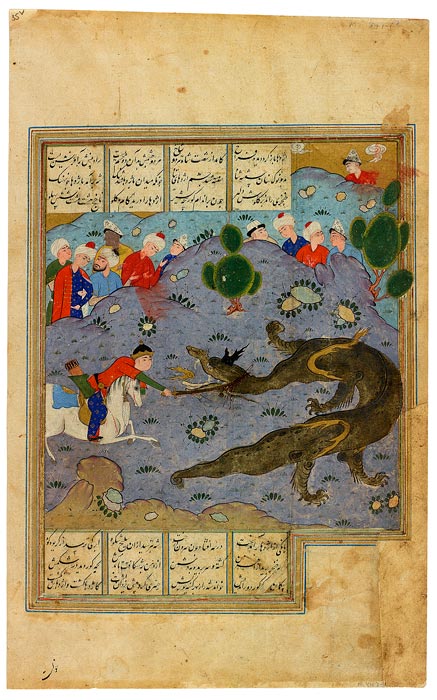
This episode appears in the Haft Paikar (Seven Princesses), the last part (1197) of the Persian poet Niẓāmī's Khamsa (Quintet). It is essentially a romanticized biography of Bahrām Gūr, a Persian king (r. 421–438) and a renowned hunter and lover.
One day, as he pursues a wild ass, Bahrām comes upon a dragon, which has just eaten the ass's foal. Called to do justice, he kills the dragon, cuts open its stomach, and sees the foal. Bahrām follows the avenged ass into the dragon's cave to discover great treasures. At the end of his life, Bahrām saw a wild ass enter a cave. Thinking it an omen, he followed it but was never seen again. Gūr, meaning "wild ass," had found the tomb (gūr) he sought—a play on words.
Persian poetry
The Persians loved their poetry and their poets, though the Qur˒an warned against believing their words (sura 69.41) and "those straying in evil who follow them" (sura 26.224). While Arabic was the first language of Islam and the language of the Qur˒an, Persian was favored by poets. Even Firdausī's (940–1020) celebrated Shāhnāma (Book of Kings), the national epic of Persian, was written in verse—some 50,000 couplets! Rūmī (1207–1273), the best known of the Sufi poets, put poetry in perspective when he wrote, "A hundred thousand books of poetry existed / Before the word of the illiterate [Prophet] they were put to shame!" (Masnavī I, 529). Presented here are illustrations of Firdausī's Shāhnāma as well as works by Sa˓ dī (ca.1184–1292), Hāfiz (ca. 1320–1389), and Jāmī (1414–1492), regarded as the last of the great Sufi poets. Also featured are illustrations from each of the five poems of the Khamsa (Quintet), by Niẓāmī (ca. 1141–1209), especially Lailā and Majnūn (The Persian Romeo and Juliet) and Bahrām Gūr's Seven Princesses.
